unit2 healthy eating
文档属性
| 名称 | unit2 healthy eating |

|
|
| 格式 | rar | ||
| 文件大小 | 452.4KB | ||
| 资源类型 | 教案 | ||
| 版本资源 | 人教版(新课程标准) | ||
| 科目 | 英语 | ||
| 更新时间 | 2008-03-19 00:00:00 | ||
图片预览

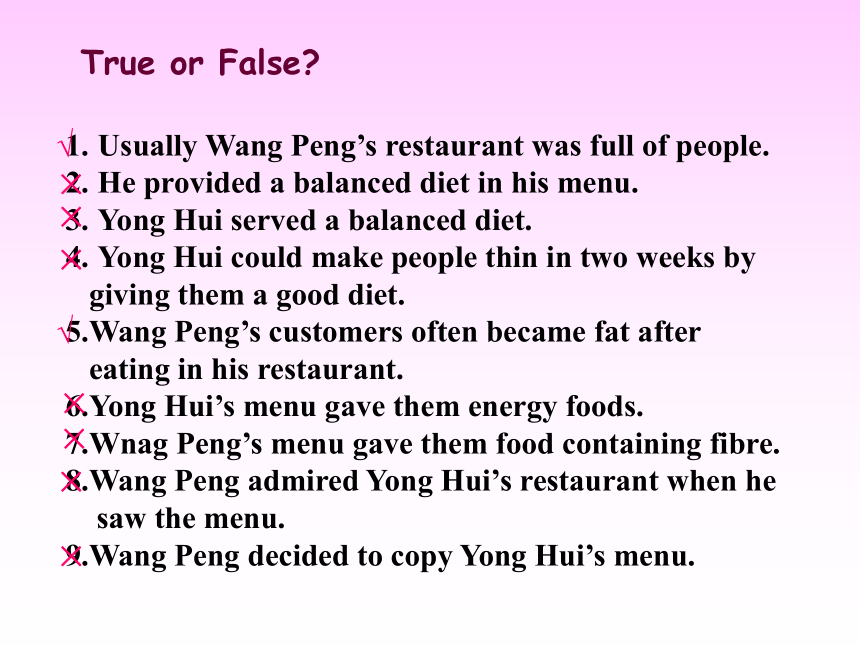


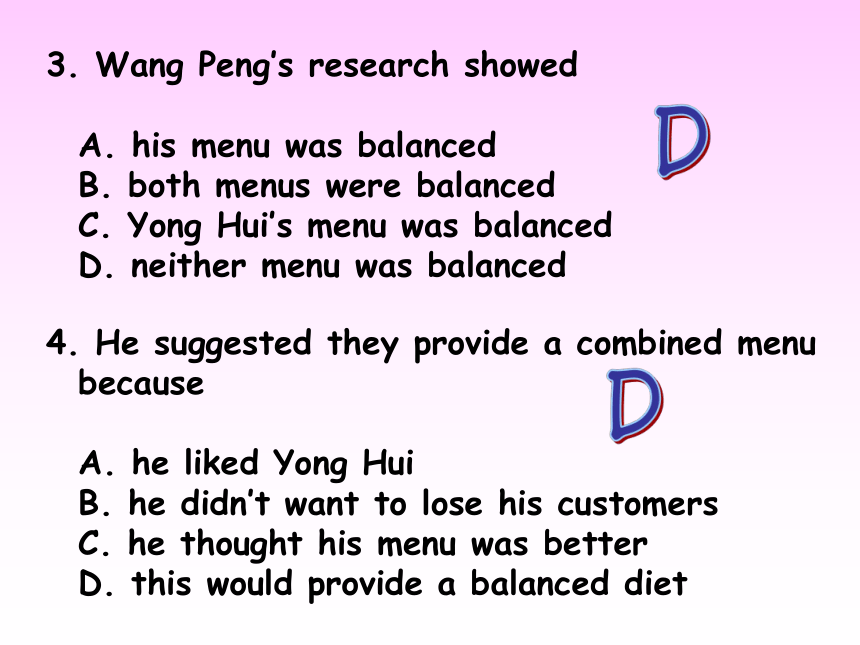




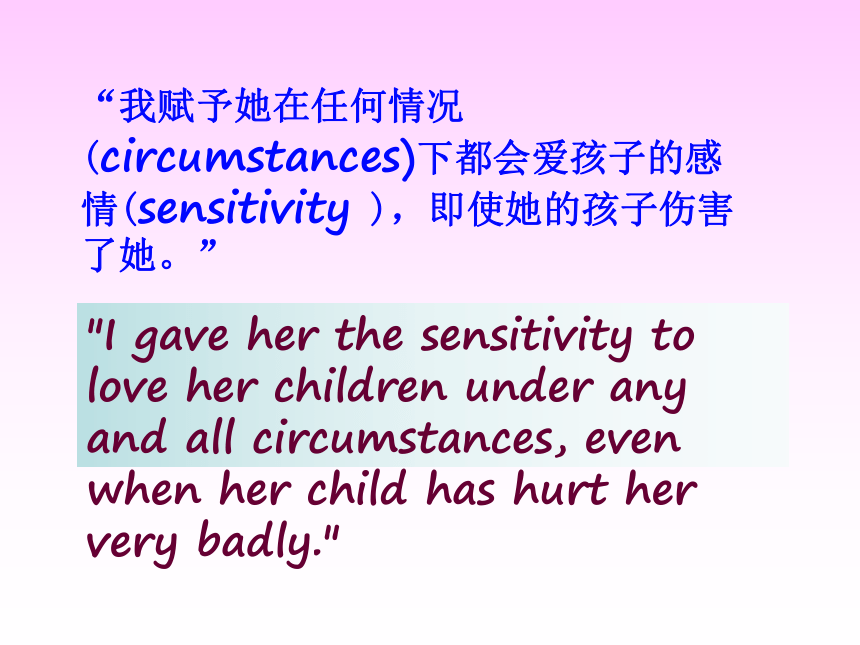
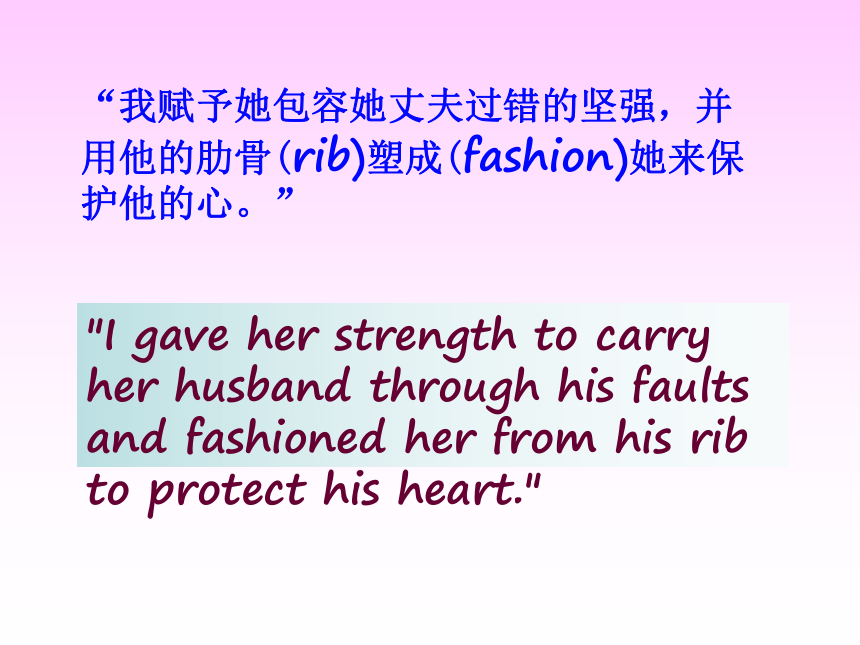
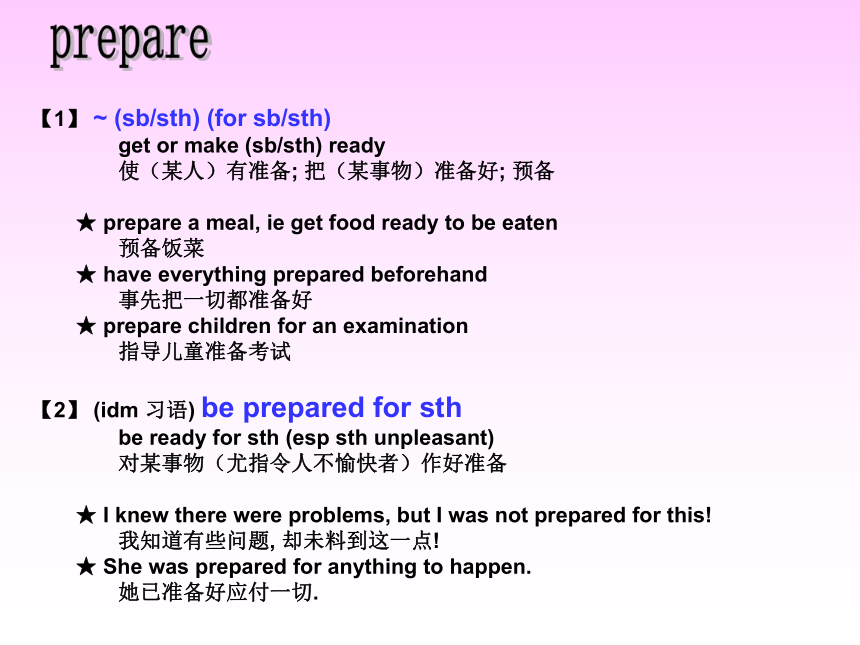
文档简介
课件66张PPT。COME AND EAT HERETrue or False?Usually Wang Peng’s restaurant was full of people.
He provided a balanced diet in his menu.
Yong Hui served a balanced diet.
Yong Hui could make people thin in two weeks by
giving them a good diet.
5.Wang Peng’s customers often became fat after
eating in his restaurant.
6.Yong Hui’s menu gave them energy foods.
7.Wnag Peng’s menu gave them food containing fibre.
8.Wang Peng admired Yong Hui’s restaurant when he
saw the menu.
9.Wang Peng decided to copy Yong Hui’s menu.
√×××√××××Choose the best answer according
to the reading textWang Peng was worried when he thought his restaurant would no longer popular because
A. he would be in debt
B. he could no longer earn his living
C. he would lose his job
D. his friends would not visit himB2. Yong Hui was very angry when she came to Wang Peng’s restaurant because
A. she thought he was a new customer
B. she thought he had spied on her restaurant
C. she was told he was a spy
D. he was too fatBD3. Wang Peng’s research showed
A. his menu was balanced
B. both menus were balanced
C. Yong Hui’s menu was balanced
D. neither menu was balanced4. He suggested they provide a combined menu because
A. he liked Yong Hui
B. he didn’t want to lose his customers
C. he thought his menu was better
D. this would provide a balanced dietDReading Fill in the form after reading.
It contains too much fatIt provided plenty of energy foodsIt offers little energy-giving foods.It provided plenty of fibre foods上帝说:“当我创造女人时,就让她很特别。我使她的肩膀能挑起整个世界;同时却又柔情似水。” God said: "When I made the woman, she had to be special. I made her shoulders strong enough to carry the weight of the world; yet, gentle enough to give comfort." “我让她的内心很坚强,能够承受分娩的痛苦,并能多次忍受来自自己孩子的拒绝。”
"I gave her an inner strength to endure childbirth and the rejection that many times comes from her children." “我赋予她耐心使她能在别人选择放弃的时候继续坚持着,并且无怨无悔的照顾自己的家人渡过疾病与疲劳(fatigue )。” "I gave her a hardness that allows her to keep going when everyone else gives up, and take care of her family through sickness and fatigue without complaining." “我赋予她在任何情况(circumstances)下都会爱孩子的感情(sensitivity ),即使她的孩子伤害了她。” "I gave her the sensitivity to love her children under any and all circumstances, even when her child has hurt her very badly." “我赋予她包容她丈夫过错的坚强,并用他的肋骨(rib)塑成(fashion)她来保护他的心。” "I gave her strength to carry her husband through his faults and fashioned her from his rib to protect his heart." 【1】 ~ (sb/sth) (for sb/sth)
get or make (sb/sth) ready
使(某人)有准备; 把(某事物)准备好; 预备
★ prepare a meal, ie get food ready to be eaten
预备饭菜
★ have everything prepared beforehand
事先把一切都准备好
★ prepare children for an examination
指导儿童准备考试
【2】 (idm 习语) be prepared for sth
be ready for sth (esp sth unpleasant)
对某事物(尤指令人不愉快者)作好准备
★ I knew there were problems, but I was not prepared for this!
我知道有些问题, 却未料到这一点!
★ She was prepared for anything to happen.
她已准备好应付一切. prepare◆be prepared to do sth
be able and willing to do sth
能够 并愿意做某事:
★ I am prepared to lend you the money if you promise to pay it back.
我愿意把钱借给你, 你得答应还给我. ◆ prepare sb. for sth
cause sb to expect sth (esp sth unpleasant)
使某人对某事物(尤指令人不愉快者)有所准备:
★ Prepare yourself for a nasty shock!
有件令人十分震惊的事, 你要有所准备!
◆ prepare to do sth.
★ Have you prepared to go on a trip?
◆ prepare for sth. 为……做准备(强调准备的目的,或为他人做准备工作,或
防备某事发生)
★ Hope for the best and prepare for the worst.
◆ prepare sth. 准备出,做出(强调准备的动作和过程)
★ Mother is praparing supper.
◆ prepare sth. for 为……准备的某事物
★ It’s time to prepare the clothes for the actors.
◆ prepare sb. to do sth. 使某人为某事做好准备
★ I prepared myself to accept defeat.
派生词:
preparation n. 准备
make preparations for 为……做准备
in preparation for 作为……的准备,以备
Nothing could be better. 比较级表示最高级
He is taller than any other boy in his class.
否定词与比较级连用表示最高级
Nobody loved money better than him.
I think nothing is more pleasant than travelling.
You couldn’t have found a better hotel than this one.see, hear, feel, listen to, look at, notice, observe, watch …
+ sb. do 看见某人做了某事(全过程)
see, hear, feel, listen to, look at, notice, observe, watch …
+ sb. doing 看见某人正在做
I saw a man enter the house secretly.
I saw a man entering the house secretly.
【1】 (a) ~ sth (by/with sth)
(cause sth to) come, go or take place after (sb/sth else) (in space,
time or order)
(使某事物)(在空间、 时间或顺序上)在(他人[他事物])之后, 来、 去
或发生; 跟随; 跟著:
★ You go first and I'll follow (on) later. 你先走, 我随后就到.
★ Monday follows Sunday. 星期一在星期日之后.
★ The lightning was quickly followed by/with heavy thunder.
闪电过后紧接著是响雷. follow(b) go after (sb) in order to catch him; chase 追捕(某人); 追逐:
★ The police were following him. 警察正在追捕他.
【2】 go along (a road, path, etc) 沿著(道路等)而行:
★ Follow this road until you get to the corner, then turn left.
沿著这条路走到拐角处, 然后向左转. 【3】 (a) act according to (sth) 按照(某事物)去做; 听从; 采用:
★ follow the instructions 按指示办事
★ follow sb's advice 听从某人的劝告.
(b) accept (sb/sth) as a guide, leader or example; copy
把(某人[某事物])当作指导、 领导、 榜样; 仿效:
★ follow the latest fashions 赶时髦
【4】 carry on (sth) as one's particular job or trade; pursue
经营(某事物); 从事:
★ follow a legal career 从事法律工作.
【5】 understand (the explanation or meaning of sth); understand (the
plot of a story)
明白(对某事物的解释或意思); 明白(故事的情节):
★ I couldn't follow his argument at all. 我根本不明白他的论点.
【6】 pay close attention to (sth); watch or listen very closely
密切注意(某事物); 注视; 倾听:
★ The President's wife follows his every word.
总统夫人总是注意听他说的话.
★ The cat followed the mouse's movements carefully.
那只猫紧盯著老鼠的动向. 【7】 take an active interest in (sth) 对(某事物)产生浓厚的兴趣:
★ Millions of fans follow the TV soap operas devotedly.
千百万观众非常著迷地收看这部电视连续剧.
【8】 read (a text) while listening to the same text being spoken by sb else;
read (a musical score) while listening to the music being performed
边听别人朗读边跟著阅读(文字); 边听正在演奏的乐曲边跟著读(乐谱):
★ Follow the text while I read it out to you. 看著课文, 听我给你朗读.
【9】 ~ (on) (from sth)
result from sth; happen as a consequence 由某事物引起; 随之发生:
★ Disease often follows (on from) starvation because the body is weakened.
疾病的产生往往是由于饥饿的缘故, 这是因身体虚弱所致.
【10】 (idm 习语) as follows (used to introduce a list) 用以列举事项:
★ The main events were as follows: first, the president's speech,
secondly the secretary's reply and thirdly, the chairman's summing-up.
主要活动如下: 第一项, 总裁讲话; 第二项, 秘书做解答; 第三项, 主席做总结.
◆ follow sb's example/lead
do as sb else has done; accept and follow sb else's decision
仿效他人的做法[按照他人的决定行事]:
★ I don't want you to follow my example and rush into marriage.
我不希望你效法我,也仓促结婚. 派生词:
◆follower [n]person who follows; supporter of a particular person, cause or belief 追随者; 拥护者; 信徒:
★ He's a follower, not a leader. 他是追随者, 不是领导者.
◆`follow-up [n]something done to continue or exploit what has already been started or done (对已开始或已完成的事物所做的)后续工作:
★ As a follow-up to the television series the BBC is publishing a book. 英国广播公司在播放那部电视连续剧以后, 即将出版一部有关的书.
◆ following[adj] 【1】 next in time 接著的:
★ It rained on the day we arrived, but the following day was sunny. 我们到达的那天正下雨, 但次日天气晴朗.
【2】 the following [sing or pl [v]] what follows or comes next 下列; 如下:
★ The following is of the greatest importance. 下面一点最为重要. ★ The following are extracts from the original article. 下面是原文的节选. be tired of sb. / sth. / doing sth.
have had enough of…, be impatient or bored with
对……不耐烦或感到厌烦
I’m tired of (listening to) your criticisms.
be tired from / with ... 是指“因……而疲倦”
He felt tired from walking. 他觉得走累了。
tired out completely exhausted 筋疲力尽
tiring adj. 令人厌倦的,令人疲劳的
a tiring journey
The work is pretty tiring.
tiresome adj. troublesome 令人厌倦的,讨厌的,烦人的
The children were being rather tiresome.
tired 【1】 [U] ~ (about sth/to do sth) 好奇心; 爱打听的癖性:
★ curiosity about distant lands 对于遥远国家的好奇心
★ He gave in to curiosity and opened the letter addressed to his sister. 他抑制不住好奇心, 拆开了别人写给他妹妹的信.
【2】 [C] strange or unusual thing or person; strange or rare object
稀奇或罕见的事物或人; 奇物; 珍品:
★ She is so eccentric that she is regarded as a bit of a curiosity.
她非常古怪, 算是个奇人. curiosity[n]curious[adj]
【1】 ~ (about sth/to do sth) (a) (approv 褒) eager to know or learn 富于好奇心的; 有求知欲的; 感兴趣的
: ★ curious about the origin of mankind/the structure of atoms
对人类的起源[原子的结 构]有兴趣的 ★ I'm curious to know what she said. 我真想知道她说了什么.
★ He is a curious boy who is always asking questions.
他是个有求知欲的孩子, 老是问这问那.
(b) (贬) having or showing too much interest in the affairs of others
对别人的事情过分感兴趣的; 爱管闲事的:
★ curious neighbours 爱打听别人闲事的邻居
★ She‘s always so curious about my work. 她总爱打听我的工作.
【2】 strange; unusual 奇特的; 不寻常的:
★ She looks rather curious with green hair. 她头发是绿的, 样子有点古怪. ★ It's curious that he didn't tell you. 他没有告诉你, 实在反常.
[尤用于被动语态] fill (sb) with great surprise or wonder
使(某人)惊异或惊奇: ★ He amazed everyone by passing his driving test.
他驾驶考试合格使大家很惊奇. ★ We were amazed at/by the change in his appearance.
他的样子变得使我们大为惊讶. ★ She was amazed/It amazed her that he was still alive.
他居然还活著使她感到惊异.
派生词:
◆amazement [n][U]: He looked at me in amazement. 他惊愕地看著我. ★ I heard with amazement that.... 我听到...大为吃惊.
◆amazing [adj](usu approv 通常作褒义): ★ an amazing speed, player, feat 令人惊异的速度、 表演者、 事迹 ★ I find it amazing that you can't swim. 你不会游泳可使我大吃一惊.
◆amazingly [adv]: She's amazingly clever. 她出奇地聪明.▲ amaze[v]
1.spend的主语必须是人, 常用于以下结构:
(1) spend time /money on sth. 在……上花费时间(金钱)。
I spent two hours on this maths problem. 这道数学题花了我两个小时。
(2) spend time / money (in) doing sth. 花费时间(金钱)做某事。
They spent two years (in) building this bridge. 造这座桥花了他们两年时间。
(3)spend money for sth. 花钱买……。
His money was spent for books. 他的钱用来买书了。
cost, spend, take, pay2.cost的主语是物或某种活动, 还可以表示“值”, 常见用法如下:
(1)sth. costs (sb.) +金钱,某物花了(某人)多少钱。
A new computer costs a lot of money. 买一台新电脑要花一大笔钱。
(2) (doing) sth. costs (sb.) +时间,某物(做某事)花了(某人)多少时间。
Remembering these new words cost him a lot of time.
他花了大量时间才记住了这些单词。 注意:cost的过去式及过去分词都是cost,并且不能用于被动句。
3.take后面常跟双宾语, 常见用法有以下几种:
(1) It takes sb. +时间+to do sth. 做某事花了某人多少时间。
It took them three years to build this road. 他们用了三年时间修完了这条路。
(2)doing sth. takes sb. +时间,做某事花了某人多少时间。
Repairing this car took him the whole afternoon. 他花了一下午修车。 4.pay的基本用法是:
pay (sb.) money for sth. 付钱(给某人)买……。
I have to pay them 20 pounds for this room each month.
我每个月要付20英磅的房租。
(2)pay for sth. 付……的钱。
I have to pay for the book lost. 我不得不赔丢失的书款。
(3)pay for sb. 替某人付钱。
Don‘t worry! I’ll pay for you. 别担心, 我会给你付钱的。
(4)pay sb. 付钱给某人。
They pay us every month.他们每月给我们报酬。
(5)pay money back 还钱。
May I borrow 12 yuan from you? I'll pay it back next week.
你能借给我12块钱吗?下周还你。
(6)pay off one's money还清钱
[v] (pt threw , pp thrown) 【1】 send (sth) through the air with some force, esp by moving the arm 投, 抛, 掷, 扔(某物):
★ How far can you throw? 你能扔多远? ★ Throw the ball to your sister. 把球扔给你妹妹. ★ (fig 比喻) She threw me an angry look, ie glanced angrily at me. 她生气地瞪了我一眼.
【2】 ~ sth around/over sb/sth; ~ sth on/off put (clothes, etc) on or off quickly or carelessly 匆忙或随随便便穿、 脱、 戴、 摘、 披(衣物等):
★ He threw a blanket over the injured man.
他急忙给受伤的人披上条毯子. ★ threw on his uniform (他)匆匆穿上制服 ★ threw off her coat (她)随手脱下大衣.
throw【 3】 turn or move (a part of the body) quickly or violently in the specified direction 快速或猛烈地(向所示之方向)转动或移动(身体的某部分):
★ He threw back his head and roared with laughter.
他仰著头哈哈大笑.
【4】 hurl (sb) to the ground or the floor 用力将(某人)摔在地上:
★ The wrestler succeeded in throwing his opponent (to the canvas).
那摔角手把对方摔倒(在地)了. 【5】 [Tn] (infml 口) disturb (sb); disconcert 惊扰(某人); 使不安; 使慌乱:
★ The news of her death really threw me. 她的死讯真让我伤心. ★ The speaker was completely thrown by the interruption.
演讲的人因受到干扰而心烦意乱. 【6】 (phr v) throw sth about/around scatter sth 乱抛某物: ★ Don't throw litter about like that.
不要乱扔杂物. ◆throw sth away (a) discard sth as useless or unwanted 丢弃某物(因无用或不需要): ★ That's rubbish you can throw it away.
那东西没用--你把它扔了吧.
(b) fail to make use of sth 未能利用某事物: ★ throw away an opportunity, advantage, etc
失去机会、 优势等
◆throw sb out force (a trouble-maker, etc) to leave 赶走, 轰走(闹事的人等): ★ The drunk was thrown out (of the pub).
那醉鬼(从酒馆)给赶了出去.
◆throw sth up 呕出(食物).
◆`throw-away [adj][attrib 作定语] intended to be discarded after use 使用后丢弃的; 一次性使用的: ★ throw-away cups, tissues, razors
一次性杯子、 纸巾、剃刀.
/laI; laI/ [v] (pt, pp lied, pres p lying)
~ (to sb) (about sth) make a statement one knows to be untrue 说谎:
★ He's lying.
★ Don't you dare lie to me! ★ She lies about her age.
她谎报年龄.
lie [n] statement one knows to be untrue 谎言; 假话:
★ His story is nothing but a pack of lies.
他说的纯粹是一派鬼话. lielie /laI; laI/ [v] (pt lay /leI; le/, pp lain /leIn; len, pres p lying)
【1】 躺; 平卧:
★ lie on one‘s back/side/front ★ Don’t lie in bed all morning!
【2】 (of a thing) be at rest on a surface (指物)平放:
★ The letter lay open on his desk.
那信摊开在他的书桌上.
【3】 be situated 位于:
★ The town lies on the coast.
/leI; le/ [v] (pt, pp laid /leId; led) (a) put (sth/sb) in a certain position or on a surface
将(某物[某人])置于某位置或某物表面:
★ lay the book on the table
★ lay the blanket over the sleeping child ★ lay oneself down to sleep ★ He laid his hand on my shoulder.
(b) put (sth) in the correct position for a particular purpose
(为某目的)将(某物)摆放于适当位置: ★ lay the foundations of a house
给房子打地基 ★ lay the table
摆设餐具准备吃饭
lay be getting `on
(a) (of a person) be/becoming old (指人)老, 变老:
★ Grandma‘s getting on a bit and doesn’t go out as much as she used to.
奶奶年事日高, 不像从前那样常出门了.
(b) (of time) be/becoming late (指时间)晚, 渐迟:
★ The time‘s getting on; we ought to be going.
时间渐晚, 我们该走了
2. sb can't/couldn't get over sth (infml 口) sb is/was shocked, surprised, amused, etc by sth 某人因某事物而震惊、 惊异、 觉得有趣等:
★ I can't get over that shirt he was wearing.
我觉得他穿的那件衬衣真可笑. ★ I can't get over how rude she was.
她很粗野, 我仍心有余悸. get 的词组3. (phr v) get a`bout (also get a`round) (be able to) move from place to place (能)各处走动:
★ He's getting about again after his accident.
他在事故过后, 渐渐又能走动了. ★ She doesn't get around much these days.
近来她不大各处走动.
◆get a`bout/a`round/`round (of news, a rumour, etc) spread from person to
person; circulate (指消息、 谣言等)传播, 流传:
★ The news of her resignation soon got about.
她辞职的消息不久就传开了.
4. get (sth) a`cross (to sb) (cause sth to) be communicated or understood (使某事)传播或为人理解:
★ Your meaning didn't really get across.
你的意思别人并未真正理解. ★ He's not very good at getting his ideas across.
他不善于表达思想. 5. get a`head (of sb) progress (beyond sb) 领先(于某人):
★ She's keen to get ahead in her career.
她热望在事业上出人头地. ★ By doing extra homework, he soon got ahead of his class-mates.
他靠多做家庭作业, 很快在班上名列前茅.
6. get a`long = get on (b). get along with sb; get a`long (together) have a
harmonious or friendly relationship with sb; get on with sb
与某人合得来; 与某人和睦相处:
★ Do you get along with your boss?/Do you and your boss get along?
你跟老板合得来吗? ★ We get along just fine.
get along with sth = get on?with?sth. 7. get a`way have a holiday 去度假: ★ We're hoping to get away for a few days at Easter.
我们盼著复活节休息几天.
◆get away (from...) succeed in leaving a place 得以离开某地:
★ I won't be able to get away (from the office) before 7.
我7时以前离不开(办公室). ◆get away (from sb/...) escape from sb or a place
逃离或摆脱开(某人或某地):
★ Two of the prisoners got away (from their captors).
有两个犯人逃走了.
◆get away with sth steal sth and escape with it 偷携某物潜逃:
★ Thieves raided the bank and got away with a lot of money.
盗贼抢劫银行, 掠走了大批现款.
8. get `back return, esp to one's home 返回; (尤指)回家:
★ What time did you get back last night?
昨晚你是什么时候回来的? ★ We only got back from our holidays yesterday.
我们昨天才度假回来.
◆get sth back obtain sth again after having lost it; recover sth
失而复得; 重新得到:
★ She's got her old job back.
她已重新获得从前那份工作. ★ I never lend books; you never get them back.
我的书决不外借, 因为总是有去无回.
9. get sb `down (infml 口) make sb depressed or demoralized
(使某人)沮丧或情绪低落:
★ This wet weather is getting me down.
这种阴湿天气使我打不起精神. ★ Don't let the incident get you down too much.
别让这事搅得你过于烦恼了. 10. get down to sth/doing sth begin to do sth; give serious attention to sth;
tackle sth 开始做某事; 重视某事物; 认真处理某事:
★ get down to business
开始办正事 ★ It's time I got down to some serious work.
我该认真干点正事了. 11. get in (a) (of a train, etc or a passenger) arrive at its destination
(指火车等或乘客)到达目的地:
★ The train got in late.
★ What time does your flight get in?
你乘的班机什么时候到? 12. get (sb) in; get (sb) into sth (cause sb to) be admitted to a school,
university, etc, esp after taking an examination
(使某人)被接纳入学; (尤指)考取:
★ He took the entrance exam but didn't get in.
他参加了入学考试但未被录取. get sth in collect or gather sth 收集或收获某物:
★ get the crops, harvest, etc in 收获作物、 庄稼等.
13.get (sb) `off
(a) (cause sb to) leave a place or start a journey
(使某人)离开某地或出发:
★ We got off immediately after breakfast.
我们吃完早餐就动身了. ★ get the children off to school
打发孩子上学.
◆get off (sth) leave (work) with permission 下班:
★ I normally get off (work) at 5.30. 我通常是5点30分下班. ★ Could you get off (work) early tomorrow? 明天你可以提前下班吗?
◆get off sth stop discussing (a particular subject) 不再讨论(某事):
★ Please can we get off the subject of dieting?
我们别讨论节食了行吗? ◆get sth off send sth by post 邮寄某物:
★ I must get these letters off by the first post tomorrow.
我这些信必须随明天首批邮件寄出. ◆get sth off (sth) remove sth from sth 从某物上移去某物: ★ Her finger was so swollen that she couldn't get her ring off.
她手指肿得褪不下戒指来.
14. get `on (a) (also get a`long) (esp followed by an [adv]or used in questions after how 后尤接副词或用于疑问句的how之后) perform or fare in a particular situation; make progress 过日子; 进展; 进步:
★ Our youngest son is getting on well at school.
我们的小儿子功课很有进步. ★ How did you get along in your driving test?
你的驾驶考试进展如何? ★ How are you getting along these days? ie Is your life enjoyable, successful, etc at the moment?
近来生活如何?
get on with sb; get `on (together) have a friendly relationship with sb; get along with sb 与某人关系良好; 与某人和睦相处:
★ She's never really got on with her sister/She and her sister have never really got on.
她和妹妹一向合不来. ★ They don't get on at all well together/with one another. ★ Our new manager is very easy to get on with.
◆get on with sth (a) 取得进展:
★ How's your son getting on with his French? ★ I'm not getting on very fast with this job.
15. get `out become known 泄露:
★ The secret got out. ★ If the news gets out there‘ll be trouble.
消息若泄露, 必将有后患.
get out (of sth) leave a place, esp in order to visit places, meet people, etc 出外走动(尤指参观、 会友等):
★ You ought to get out (of the house) more.
★ We love to get out into the countryside at weekends.
我们周末爱到郊外去玩儿.
16. get over sth overcome, surmount or master sth 克服; 战胜; 掌握:
★ She can't get over her shyness. ★ I think the problem can be got over without too much difficulty.
我认为问题不太难解决.
get sth over (to sb) make sth clear to sb; communicate sth to sb
向某人讲清某事; 向某人表达某事: ★ She didn't really get her meaning over to her audience.
她并未真正把意思向听众讲清楚. 17. get through sth (a) use up or consume (the specified quantity or amount of sth)
用完, 消耗掉(一定量的某物):
★ She gets through forty cigarettes a day.
她一天抽四十枝香烟. ★ We got through a fortune while we were on holiday!
我们度假花了一大笔钱!
(b) (manage to) do or complete sth (设法)做或完成某事:
★ Let's start; there's a lot of work to get through/to be got through.
开始吧, 有大批工作要做呢.
◆get (sb) `through (sth) (help sb to) be successful in or pass (an examination,
a test, etc) (帮助某人)(考试、 测验等)及格:
★ Tom failed but his sister got through.
汤姆不及格, 但他妹妹及格了. ★ She got all her pupils through French `A' Level.
在她的帮助下, 所有学生的法语高级考试都及 格了.
◆get (sth) `through (sth) (cause sth to) be officially approved or accepted (
使某事物)正式通过或被采纳:
★ Do you think the Bill will get through (Parliament)?
你认为那议案(议会)能通过 ◆ win sth/sb back
regain sth/sb after a struggle 经过奋斗重新获得某事物[某人]:
★ The party must try to win back the support it has lost.
该党须设法重获人心. ★ He hoped to win her love back.
他希望努力重新获得她的爱.
◆win sb over/round (to sth)
gain sb‘s support or favour, esp by persuasion
获得某人的支持或好感(尤指通过劝说)
: ★ She’s against the idea, but I‘m sure I can win her over.
她反对这个意见, 但我准能说服她改变主意.
win的词组◆win out/through
come successfully through a difficult period; achieve success eventually
摆脱困境; 终获成功:
★ We are faced with a lot of problems but we’ll win through in the end.
我们面临许多问题, 但终将获得成功.
派生词:
◆winner [n] person, horse, etc that wins 获胜的人、 马等:
★ The winner was presented with a trophy.
获胜者得到了奖品. calm[adj] (-er, -est) 【1】 (a) (of the sea) without large waves; still (指海洋)无浪的, 平静的. (b) (of the weather) not windy (指天气)无风的: ★ a calm, cloudless day 无风无云的一天. 【2】 not excited, nervous or agitated; quiet; untroubled 镇定的; 安静的; 无忧虑的: ★ It is important to keep/stay calm in an emergency. 在紧急情况下保持镇静是很重要的. ★ The city is calm again after yesterday's riots. 这座城市经过昨天的动乱以后又平静下来了. →Usage at?quiet?用法见quiet. 词组:
◆calm ~ (sb) (down) (使某人)平静, 镇静, 安静:
★ Just calm down a bit! 你先静一静!
★ Have a brandy it'll help to calm you (down).
来点儿白兰地--能使你静下来. 派生词:
◆calmly [adv]:
He walked into the shop and calmly stole a pair of gloves.
他走进商店若无其事地偷了一副手套. ◆calmness [n][U].explain[v]
【1】 ~ sth (to sb) make sth plain or clear; give the meaning of sth
解释; 讲解; 说明; 阐明:
★ A dictionary explains the meaning of words.
词典是解释词义的工具书. ★ He explained his plan in some detail.
他仔细地说明了自己的计划. ★ Please explain this problem to me.
请把这个问题给我讲解一下.
【2】 ~ sth (to sb) give or be a reason for sth; account for sth
说明某事物的原因或理由; 为某事物辩解:
★ He explained that his train had been delayed.
他解释说他乘坐的火车误点了. ★ They explained what had happened.
他们为所发生的事进行了辩解. ★ She explained her conduct to her boss.
她向老板说明了自己那种表现的原因. 【3】 (idm 习语) ex`plain oneself
(a) make one's meaning clear 把自己的意思解释清楚:
★ I don't understand your argument. Could you explain yourself a bit more? 我不明白你的论点, 你能把意思再说清楚些吗?
(b) give reasons for one's behaviour 为自己的行为作解释:
★ In recent weeks you've been late every day. Please explain yourself.
近几个星期以来你每天都迟到. 请你说说原因.
【4】 explain sth away give excuses why one should not be blamed for (a fault, mistake, etc) or why sth is not important
为(过失或错误等)辩解; 为某事物搪塞:
★ You will find it difficult to explain away your use of such offensive language.
你使用这样无礼的语言是很难说得过去的. ★ He explained away his late arrival by blaming it on the crowded roads.
他辩称路上人多而把迟到一事推脱得一干二净.
[v] (-tt-pt, pp upset) 【1】 [I, Tn](cause sth to) become overturned or spilt, esp accidentally
打翻, 弄翻(某物)(尤指无意地):
★ upset one's cup, the milk, a plate of biscuits
弄翻了自己的杯子、 牛奶、 一盘饼干 ★ A large wave upset the boat. 一个巨浪打翻了船.
【2】 disrupt (a plan, etc) 打乱, 扰乱(计画等):
★ upset the balance of trade 打破贸易平衡 ★ Our arrangements for the weekend were upset by her visit.
她一来把我们周末的安排给打乱了. ★ Fog upset the train timetable.
这场大雾搅乱了火车的班次. upset【3】 (a) distress the mind or feelings of (sb) 使(某人)苦恼或心烦:
★ Don't upset yourself -- no harm has been done.
不要难过--并没有造成伤害. ★ The sight of physical suffering always upsets me.
我看到身体受折磨的情形总是心惊肉跳. ★ He was upset at not being invited.
人家没邀请他, 他很不痛快.
(b) cause (sb) to feel ill by disturbing his digestion 使(某人)感到肠胃不适:
★ Cheese often upsets her/her stomach.
她吃乳酪后常常感到不舒服[肠胃不适]. [n][C] 【1】 point or line beyond which sth does not extend; boundary
限度; 极限; 界线; 限界:
★ within the city limits
在该城范围内 ★ (fig 比喻) He tried my patience to its limits.
他把我逼得忍无可忍了. ★ No fishing is allowed within a twenty-mile limit.
二十英里范围内不准垂钓. 【2】 greatest amount allowed or possible 允许的或可能的最大限度; 限量:
★ The speed limit on this road is 70 mph.
这条路的车速限制是每小时70英里. ★ There's a limit to how much I'm prepared to spend.
我准备花多少钱是有限度的. limit◆limitless [adj]without limit 无限制的; 无限度的; 无界限的; 无止境的:
★ limitless ambition, greed, wealth
无限度的野心、 贪欲、 财富.
limit [v] ~ sb/sth (to sth) set a limit or limits to sb/sth; restrict sb/sth
给某人[某事物]定界限; 限定某人[某事物]:
★ We must try and limit our expenditure.
我们必须设法限制我们的开支. 派生词:
◆limited [adj]restricted; few or small 有限的; 少的;小的:
★ Only a limited number of places is available.
只有少数地方可供使用. ★ His intelligence is rather limited.
他的智力相当有限. [n](a) [U] profit; gain; future good (used esp with the vs and preps shown) 利益, 实惠, 未来的好处(尤与以下所示动词及介词连用):
★ A change in the law would be to everyone's benefit.
法律中的一项修改将符合所有人的利益.
(b) [C] thing from which one gains or profits; advantage 优越性; 优良条件
: ★ the benefits of modern medicine, science, higher education
现代医学、 科学、 高等教育的优良条件. ◆benefit [v] (pt, pp -fited; US also -fitted)
【1】 [Tn]do good to (sb/sth) 使(某人[某事物])受益:
★ These facilities have benefited the whole town.
这些设施使全城受益.
【2】 [I, Ipr] ~ (from/by sth) receive benefit or gain 得益:
★ Who stands to (ie is likely to) benefit most by the new tax laws?
什么人可能从新的税法中得到最大的好处?benefit[v] 【1】 ~ sb/sth (into/to sth)
(a) allow sb/sth to enter 许可某人[某物]进入:
★ That man is not to be admitted.
不准那个人进来. ★ Each ticket admits two people to the party.
每张票可供两人入场参加聚会.
(b) accept sb into a hospital as a patient, or into a school, etc as a pupil 接受某人(入院或入学等):
★ The school admits sixty new boys and girls every year.
这所学校每年招收六十名男女新生. admit【2】 (of an enclosed space) have room for (sb/sth)
(指一范围内)可容纳(某人[某事物]):
★ The theatre admits only 250 people.
这家戏院只能容纳250人.
【3】 ~ to sth/doing sth recognize or acknowledge sth as true, often reluctantly; confess sth
承认, 供认, 招认(常为不情愿地); 坦白某事物:
★ George would never admit to being wrong.
乔治从不认错. ★ He admitted having stolen the car.
他招认偷了那辆汽车. [v]【1】 ~ sth (to sb) (for sth)
put forward sth (to sb) to be considered and accepted or refused; present (向某人)提出某事物供考虑、 接受或拒绝; 提供:
★ The company has offered a high salary.
公司已提出高薪相聘. ★ I've been offered a job in Japan. 日本有份工作要聘请我去做. 【2】 ~ sth (to sb)
show or express the willingness or intention to do, give, etc sth 表示愿意或有意做、 给...某事物:
★ We offered to leave.
我们表示要走了. ★ We offered him a lift, but he didn't accept.
我们建议他搭我们的车, 但他没有接受. offer◆offer [n] [C] ~ (to sb/to do sth) statement offering to do or give sth to sb
(为某人做某事物或给某人某事物的)提议, 建议:
★ an offer of help from the community 社区提出的帮助建议 ★ your kind offer to help 你愿意帮忙的好意 [v]【1】 ~ (with sth); ~ A and B/A with B
(cause things to) join or mix together to form a whole
(使物件)结合或混合形成一整体; 联合; 组合; 合并; 化合: ★ Success was achieved by the combined efforts of the whole team.
全队齐心协力取得了胜利. 【2】 ~ A and B/A with B
do (two or more things) at the same time or have (two or more different qualities) as a characteristic
同时做(不止一件事); 兼有(不止一种)特性:
★ combine business with pleasure
寓工作于娱乐之中 combinecut 的词组~ sth (from sth); ~ sth (for sb)
★ She cut a slice of beef from the joint.
她从大块的牛肉上切下一片来. ★ Please cut me a piece of cake/cut a piece of cake for me.
请给我切块蛋糕.
2. ~ sth (in/into sth) divide sth (into smaller pieces) with a knife, etc
(用刀等)把某物切割成小块:
★ She cut the meat into cubes.
她把肉切成小块儿. ★ cut apples into halves, thirds, quarters, etc
把苹果切成两半、 三瓣、 四瓣等
3. cut sth away (from sth) remove sth (from sth) by cutting
(自某物上)切除, 剪去, 破掉某物:
★ They cut away all the dead branches from the tree.
他们把树上的枯枝通通砍掉了.4. cut sth down (a) cause sth to fall down by cutting it at the base (自基础部分)砍倒:
★ cut down a tree
(b) reduce the length of sth; shorten sth
缩短某物; 删减某物:
★ cut down a pair of trousers 把裤子改短 ★ Your article's too long -- please cut it down to 1000 words.
你的文章太长--请把它删减到1000字.
◆cut sth down; cut down (on sth)
reduce the amount or quantity of sth; consume, use or buy less (of sth)
减少某事物的数额或数量; 减少消耗, 少用或少买(某物):
★ cut down one's expenses
★ The doctor told him to cut down his consumption of fat.
医生建议他减少脂肪的摄取量. 5. cut in (on sb/sth); cut into sth interrupt sb/sth 打断、 打搅某人[某事物]:
★ She kept cutting in on/cutting into our conversation.
我们谈话时她老是插嘴.
6. cut sb/sth off (often passive 常用于被动语态) stop the supply of sth to sb
停止向某人供应某物:
★ If you don't pay your gas bill soon you may be cut off.
你若不立即付清煤气费, 就要停止向你供气. ★ Our water supply has been cut off. ★ Her father cut off (ie stopped paying) her allowance.
她父亲不再给她零用钱了.
7. cut sth up divide sth into small pieces with a knife, etc
用刀等把某物分成小块; 切碎; 剪碎:
★ cut up vegetablesSincere thanks for your listening ! Bye Bye !
He provided a balanced diet in his menu.
Yong Hui served a balanced diet.
Yong Hui could make people thin in two weeks by
giving them a good diet.
5.Wang Peng’s customers often became fat after
eating in his restaurant.
6.Yong Hui’s menu gave them energy foods.
7.Wnag Peng’s menu gave them food containing fibre.
8.Wang Peng admired Yong Hui’s restaurant when he
saw the menu.
9.Wang Peng decided to copy Yong Hui’s menu.
√×××√××××Choose the best answer according
to the reading textWang Peng was worried when he thought his restaurant would no longer popular because
A. he would be in debt
B. he could no longer earn his living
C. he would lose his job
D. his friends would not visit himB2. Yong Hui was very angry when she came to Wang Peng’s restaurant because
A. she thought he was a new customer
B. she thought he had spied on her restaurant
C. she was told he was a spy
D. he was too fatBD3. Wang Peng’s research showed
A. his menu was balanced
B. both menus were balanced
C. Yong Hui’s menu was balanced
D. neither menu was balanced4. He suggested they provide a combined menu because
A. he liked Yong Hui
B. he didn’t want to lose his customers
C. he thought his menu was better
D. this would provide a balanced dietDReading Fill in the form after reading.
It contains too much fatIt provided plenty of energy foodsIt offers little energy-giving foods.It provided plenty of fibre foods上帝说:“当我创造女人时,就让她很特别。我使她的肩膀能挑起整个世界;同时却又柔情似水。” God said: "When I made the woman, she had to be special. I made her shoulders strong enough to carry the weight of the world; yet, gentle enough to give comfort." “我让她的内心很坚强,能够承受分娩的痛苦,并能多次忍受来自自己孩子的拒绝。”
"I gave her an inner strength to endure childbirth and the rejection that many times comes from her children." “我赋予她耐心使她能在别人选择放弃的时候继续坚持着,并且无怨无悔的照顾自己的家人渡过疾病与疲劳(fatigue )。” "I gave her a hardness that allows her to keep going when everyone else gives up, and take care of her family through sickness and fatigue without complaining." “我赋予她在任何情况(circumstances)下都会爱孩子的感情(sensitivity ),即使她的孩子伤害了她。” "I gave her the sensitivity to love her children under any and all circumstances, even when her child has hurt her very badly." “我赋予她包容她丈夫过错的坚强,并用他的肋骨(rib)塑成(fashion)她来保护他的心。” "I gave her strength to carry her husband through his faults and fashioned her from his rib to protect his heart." 【1】 ~ (sb/sth) (for sb/sth)
get or make (sb/sth) ready
使(某人)有准备; 把(某事物)准备好; 预备
★ prepare a meal, ie get food ready to be eaten
预备饭菜
★ have everything prepared beforehand
事先把一切都准备好
★ prepare children for an examination
指导儿童准备考试
【2】 (idm 习语) be prepared for sth
be ready for sth (esp sth unpleasant)
对某事物(尤指令人不愉快者)作好准备
★ I knew there were problems, but I was not prepared for this!
我知道有些问题, 却未料到这一点!
★ She was prepared for anything to happen.
她已准备好应付一切. prepare◆be prepared to do sth
be able and willing to do sth
能够 并愿意做某事:
★ I am prepared to lend you the money if you promise to pay it back.
我愿意把钱借给你, 你得答应还给我. ◆ prepare sb. for sth
cause sb to expect sth (esp sth unpleasant)
使某人对某事物(尤指令人不愉快者)有所准备:
★ Prepare yourself for a nasty shock!
有件令人十分震惊的事, 你要有所准备!
◆ prepare to do sth.
★ Have you prepared to go on a trip?
◆ prepare for sth. 为……做准备(强调准备的目的,或为他人做准备工作,或
防备某事发生)
★ Hope for the best and prepare for the worst.
◆ prepare sth. 准备出,做出(强调准备的动作和过程)
★ Mother is praparing supper.
◆ prepare sth. for 为……准备的某事物
★ It’s time to prepare the clothes for the actors.
◆ prepare sb. to do sth. 使某人为某事做好准备
★ I prepared myself to accept defeat.
派生词:
preparation n. 准备
make preparations for 为……做准备
in preparation for 作为……的准备,以备
Nothing could be better. 比较级表示最高级
He is taller than any other boy in his class.
否定词与比较级连用表示最高级
Nobody loved money better than him.
I think nothing is more pleasant than travelling.
You couldn’t have found a better hotel than this one.see, hear, feel, listen to, look at, notice, observe, watch …
+ sb. do 看见某人做了某事(全过程)
see, hear, feel, listen to, look at, notice, observe, watch …
+ sb. doing 看见某人正在做
I saw a man enter the house secretly.
I saw a man entering the house secretly.
【1】 (a) ~ sth (by/with sth)
(cause sth to) come, go or take place after (sb/sth else) (in space,
time or order)
(使某事物)(在空间、 时间或顺序上)在(他人[他事物])之后, 来、 去
或发生; 跟随; 跟著:
★ You go first and I'll follow (on) later. 你先走, 我随后就到.
★ Monday follows Sunday. 星期一在星期日之后.
★ The lightning was quickly followed by/with heavy thunder.
闪电过后紧接著是响雷. follow(b) go after (sb) in order to catch him; chase 追捕(某人); 追逐:
★ The police were following him. 警察正在追捕他.
【2】 go along (a road, path, etc) 沿著(道路等)而行:
★ Follow this road until you get to the corner, then turn left.
沿著这条路走到拐角处, 然后向左转. 【3】 (a) act according to (sth) 按照(某事物)去做; 听从; 采用:
★ follow the instructions 按指示办事
★ follow sb's advice 听从某人的劝告.
(b) accept (sb/sth) as a guide, leader or example; copy
把(某人[某事物])当作指导、 领导、 榜样; 仿效:
★ follow the latest fashions 赶时髦
【4】 carry on (sth) as one's particular job or trade; pursue
经营(某事物); 从事:
★ follow a legal career 从事法律工作.
【5】 understand (the explanation or meaning of sth); understand (the
plot of a story)
明白(对某事物的解释或意思); 明白(故事的情节):
★ I couldn't follow his argument at all. 我根本不明白他的论点.
【6】 pay close attention to (sth); watch or listen very closely
密切注意(某事物); 注视; 倾听:
★ The President's wife follows his every word.
总统夫人总是注意听他说的话.
★ The cat followed the mouse's movements carefully.
那只猫紧盯著老鼠的动向. 【7】 take an active interest in (sth) 对(某事物)产生浓厚的兴趣:
★ Millions of fans follow the TV soap operas devotedly.
千百万观众非常著迷地收看这部电视连续剧.
【8】 read (a text) while listening to the same text being spoken by sb else;
read (a musical score) while listening to the music being performed
边听别人朗读边跟著阅读(文字); 边听正在演奏的乐曲边跟著读(乐谱):
★ Follow the text while I read it out to you. 看著课文, 听我给你朗读.
【9】 ~ (on) (from sth)
result from sth; happen as a consequence 由某事物引起; 随之发生:
★ Disease often follows (on from) starvation because the body is weakened.
疾病的产生往往是由于饥饿的缘故, 这是因身体虚弱所致.
【10】 (idm 习语) as follows (used to introduce a list) 用以列举事项:
★ The main events were as follows: first, the president's speech,
secondly the secretary's reply and thirdly, the chairman's summing-up.
主要活动如下: 第一项, 总裁讲话; 第二项, 秘书做解答; 第三项, 主席做总结.
◆ follow sb's example/lead
do as sb else has done; accept and follow sb else's decision
仿效他人的做法[按照他人的决定行事]:
★ I don't want you to follow my example and rush into marriage.
我不希望你效法我,也仓促结婚. 派生词:
◆follower [n]person who follows; supporter of a particular person, cause or belief 追随者; 拥护者; 信徒:
★ He's a follower, not a leader. 他是追随者, 不是领导者.
◆`follow-up [n]something done to continue or exploit what has already been started or done (对已开始或已完成的事物所做的)后续工作:
★ As a follow-up to the television series the BBC is publishing a book. 英国广播公司在播放那部电视连续剧以后, 即将出版一部有关的书.
◆ following[adj] 【1】 next in time 接著的:
★ It rained on the day we arrived, but the following day was sunny. 我们到达的那天正下雨, 但次日天气晴朗.
【2】 the following [sing or pl [v]] what follows or comes next 下列; 如下:
★ The following is of the greatest importance. 下面一点最为重要. ★ The following are extracts from the original article. 下面是原文的节选. be tired of sb. / sth. / doing sth.
have had enough of…, be impatient or bored with
对……不耐烦或感到厌烦
I’m tired of (listening to) your criticisms.
be tired from / with ... 是指“因……而疲倦”
He felt tired from walking. 他觉得走累了。
tired out completely exhausted 筋疲力尽
tiring adj. 令人厌倦的,令人疲劳的
a tiring journey
The work is pretty tiring.
tiresome adj. troublesome 令人厌倦的,讨厌的,烦人的
The children were being rather tiresome.
tired 【1】 [U] ~ (about sth/to do sth) 好奇心; 爱打听的癖性:
★ curiosity about distant lands 对于遥远国家的好奇心
★ He gave in to curiosity and opened the letter addressed to his sister. 他抑制不住好奇心, 拆开了别人写给他妹妹的信.
【2】 [C] strange or unusual thing or person; strange or rare object
稀奇或罕见的事物或人; 奇物; 珍品:
★ She is so eccentric that she is regarded as a bit of a curiosity.
她非常古怪, 算是个奇人. curiosity[n]curious[adj]
【1】 ~ (about sth/to do sth) (a) (approv 褒) eager to know or learn 富于好奇心的; 有求知欲的; 感兴趣的
: ★ curious about the origin of mankind/the structure of atoms
对人类的起源[原子的结 构]有兴趣的 ★ I'm curious to know what she said. 我真想知道她说了什么.
★ He is a curious boy who is always asking questions.
他是个有求知欲的孩子, 老是问这问那.
(b) (贬) having or showing too much interest in the affairs of others
对别人的事情过分感兴趣的; 爱管闲事的:
★ curious neighbours 爱打听别人闲事的邻居
★ She‘s always so curious about my work. 她总爱打听我的工作.
【2】 strange; unusual 奇特的; 不寻常的:
★ She looks rather curious with green hair. 她头发是绿的, 样子有点古怪. ★ It's curious that he didn't tell you. 他没有告诉你, 实在反常.
[尤用于被动语态] fill (sb) with great surprise or wonder
使(某人)惊异或惊奇: ★ He amazed everyone by passing his driving test.
他驾驶考试合格使大家很惊奇. ★ We were amazed at/by the change in his appearance.
他的样子变得使我们大为惊讶. ★ She was amazed/It amazed her that he was still alive.
他居然还活著使她感到惊异.
派生词:
◆amazement [n][U]: He looked at me in amazement. 他惊愕地看著我. ★ I heard with amazement that.... 我听到...大为吃惊.
◆amazing [adj](usu approv 通常作褒义): ★ an amazing speed, player, feat 令人惊异的速度、 表演者、 事迹 ★ I find it amazing that you can't swim. 你不会游泳可使我大吃一惊.
◆amazingly [adv]: She's amazingly clever. 她出奇地聪明.▲ amaze[v]
1.spend的主语必须是人, 常用于以下结构:
(1) spend time /money on sth. 在……上花费时间(金钱)。
I spent two hours on this maths problem. 这道数学题花了我两个小时。
(2) spend time / money (in) doing sth. 花费时间(金钱)做某事。
They spent two years (in) building this bridge. 造这座桥花了他们两年时间。
(3)spend money for sth. 花钱买……。
His money was spent for books. 他的钱用来买书了。
cost, spend, take, pay2.cost的主语是物或某种活动, 还可以表示“值”, 常见用法如下:
(1)sth. costs (sb.) +金钱,某物花了(某人)多少钱。
A new computer costs a lot of money. 买一台新电脑要花一大笔钱。
(2) (doing) sth. costs (sb.) +时间,某物(做某事)花了(某人)多少时间。
Remembering these new words cost him a lot of time.
他花了大量时间才记住了这些单词。 注意:cost的过去式及过去分词都是cost,并且不能用于被动句。
3.take后面常跟双宾语, 常见用法有以下几种:
(1) It takes sb. +时间+to do sth. 做某事花了某人多少时间。
It took them three years to build this road. 他们用了三年时间修完了这条路。
(2)doing sth. takes sb. +时间,做某事花了某人多少时间。
Repairing this car took him the whole afternoon. 他花了一下午修车。 4.pay的基本用法是:
pay (sb.) money for sth. 付钱(给某人)买……。
I have to pay them 20 pounds for this room each month.
我每个月要付20英磅的房租。
(2)pay for sth. 付……的钱。
I have to pay for the book lost. 我不得不赔丢失的书款。
(3)pay for sb. 替某人付钱。
Don‘t worry! I’ll pay for you. 别担心, 我会给你付钱的。
(4)pay sb. 付钱给某人。
They pay us every month.他们每月给我们报酬。
(5)pay money back 还钱。
May I borrow 12 yuan from you? I'll pay it back next week.
你能借给我12块钱吗?下周还你。
(6)pay off one's money还清钱
[v] (pt threw , pp thrown) 【1】 send (sth) through the air with some force, esp by moving the arm 投, 抛, 掷, 扔(某物):
★ How far can you throw? 你能扔多远? ★ Throw the ball to your sister. 把球扔给你妹妹. ★ (fig 比喻) She threw me an angry look, ie glanced angrily at me. 她生气地瞪了我一眼.
【2】 ~ sth around/over sb/sth; ~ sth on/off put (clothes, etc) on or off quickly or carelessly 匆忙或随随便便穿、 脱、 戴、 摘、 披(衣物等):
★ He threw a blanket over the injured man.
他急忙给受伤的人披上条毯子. ★ threw on his uniform (他)匆匆穿上制服 ★ threw off her coat (她)随手脱下大衣.
throw【 3】 turn or move (a part of the body) quickly or violently in the specified direction 快速或猛烈地(向所示之方向)转动或移动(身体的某部分):
★ He threw back his head and roared with laughter.
他仰著头哈哈大笑.
【4】 hurl (sb) to the ground or the floor 用力将(某人)摔在地上:
★ The wrestler succeeded in throwing his opponent (to the canvas).
那摔角手把对方摔倒(在地)了. 【5】 [Tn] (infml 口) disturb (sb); disconcert 惊扰(某人); 使不安; 使慌乱:
★ The news of her death really threw me. 她的死讯真让我伤心. ★ The speaker was completely thrown by the interruption.
演讲的人因受到干扰而心烦意乱. 【6】 (phr v) throw sth about/around scatter sth 乱抛某物: ★ Don't throw litter about like that.
不要乱扔杂物. ◆throw sth away (a) discard sth as useless or unwanted 丢弃某物(因无用或不需要): ★ That's rubbish you can throw it away.
那东西没用--你把它扔了吧.
(b) fail to make use of sth 未能利用某事物: ★ throw away an opportunity, advantage, etc
失去机会、 优势等
◆throw sb out force (a trouble-maker, etc) to leave 赶走, 轰走(闹事的人等): ★ The drunk was thrown out (of the pub).
那醉鬼(从酒馆)给赶了出去.
◆throw sth up 呕出(食物).
◆`throw-away [adj][attrib 作定语] intended to be discarded after use 使用后丢弃的; 一次性使用的: ★ throw-away cups, tissues, razors
一次性杯子、 纸巾、剃刀.
/laI; laI/ [v] (pt, pp lied, pres p lying)
~ (to sb) (about sth) make a statement one knows to be untrue 说谎:
★ He's lying.
★ Don't you dare lie to me! ★ She lies about her age.
她谎报年龄.
lie [n] statement one knows to be untrue 谎言; 假话:
★ His story is nothing but a pack of lies.
他说的纯粹是一派鬼话. lielie /laI; laI/ [v] (pt lay /leI; le/, pp lain /leIn; len, pres p lying)
【1】 躺; 平卧:
★ lie on one‘s back/side/front ★ Don’t lie in bed all morning!
【2】 (of a thing) be at rest on a surface (指物)平放:
★ The letter lay open on his desk.
那信摊开在他的书桌上.
【3】 be situated 位于:
★ The town lies on the coast.
/leI; le/ [v] (pt, pp laid /leId; led) (a) put (sth/sb) in a certain position or on a surface
将(某物[某人])置于某位置或某物表面:
★ lay the book on the table
★ lay the blanket over the sleeping child ★ lay oneself down to sleep ★ He laid his hand on my shoulder.
(b) put (sth) in the correct position for a particular purpose
(为某目的)将(某物)摆放于适当位置: ★ lay the foundations of a house
给房子打地基 ★ lay the table
摆设餐具准备吃饭
lay be getting `on
(a) (of a person) be/becoming old (指人)老, 变老:
★ Grandma‘s getting on a bit and doesn’t go out as much as she used to.
奶奶年事日高, 不像从前那样常出门了.
(b) (of time) be/becoming late (指时间)晚, 渐迟:
★ The time‘s getting on; we ought to be going.
时间渐晚, 我们该走了
2. sb can't/couldn't get over sth (infml 口) sb is/was shocked, surprised, amused, etc by sth 某人因某事物而震惊、 惊异、 觉得有趣等:
★ I can't get over that shirt he was wearing.
我觉得他穿的那件衬衣真可笑. ★ I can't get over how rude she was.
她很粗野, 我仍心有余悸. get 的词组3. (phr v) get a`bout (also get a`round) (be able to) move from place to place (能)各处走动:
★ He's getting about again after his accident.
他在事故过后, 渐渐又能走动了. ★ She doesn't get around much these days.
近来她不大各处走动.
◆get a`bout/a`round/`round (of news, a rumour, etc) spread from person to
person; circulate (指消息、 谣言等)传播, 流传:
★ The news of her resignation soon got about.
她辞职的消息不久就传开了.
4. get (sth) a`cross (to sb) (cause sth to) be communicated or understood (使某事)传播或为人理解:
★ Your meaning didn't really get across.
你的意思别人并未真正理解. ★ He's not very good at getting his ideas across.
他不善于表达思想. 5. get a`head (of sb) progress (beyond sb) 领先(于某人):
★ She's keen to get ahead in her career.
她热望在事业上出人头地. ★ By doing extra homework, he soon got ahead of his class-mates.
他靠多做家庭作业, 很快在班上名列前茅.
6. get a`long = get on (b). get along with sb; get a`long (together) have a
harmonious or friendly relationship with sb; get on with sb
与某人合得来; 与某人和睦相处:
★ Do you get along with your boss?/Do you and your boss get along?
你跟老板合得来吗? ★ We get along just fine.
get along with sth = get on?with?sth. 7. get a`way have a holiday 去度假: ★ We're hoping to get away for a few days at Easter.
我们盼著复活节休息几天.
◆get away (from...) succeed in leaving a place 得以离开某地:
★ I won't be able to get away (from the office) before 7.
我7时以前离不开(办公室). ◆get away (from sb/...) escape from sb or a place
逃离或摆脱开(某人或某地):
★ Two of the prisoners got away (from their captors).
有两个犯人逃走了.
◆get away with sth steal sth and escape with it 偷携某物潜逃:
★ Thieves raided the bank and got away with a lot of money.
盗贼抢劫银行, 掠走了大批现款.
8. get `back return, esp to one's home 返回; (尤指)回家:
★ What time did you get back last night?
昨晚你是什么时候回来的? ★ We only got back from our holidays yesterday.
我们昨天才度假回来.
◆get sth back obtain sth again after having lost it; recover sth
失而复得; 重新得到:
★ She's got her old job back.
她已重新获得从前那份工作. ★ I never lend books; you never get them back.
我的书决不外借, 因为总是有去无回.
9. get sb `down (infml 口) make sb depressed or demoralized
(使某人)沮丧或情绪低落:
★ This wet weather is getting me down.
这种阴湿天气使我打不起精神. ★ Don't let the incident get you down too much.
别让这事搅得你过于烦恼了. 10. get down to sth/doing sth begin to do sth; give serious attention to sth;
tackle sth 开始做某事; 重视某事物; 认真处理某事:
★ get down to business
开始办正事 ★ It's time I got down to some serious work.
我该认真干点正事了. 11. get in (a) (of a train, etc or a passenger) arrive at its destination
(指火车等或乘客)到达目的地:
★ The train got in late.
★ What time does your flight get in?
你乘的班机什么时候到? 12. get (sb) in; get (sb) into sth (cause sb to) be admitted to a school,
university, etc, esp after taking an examination
(使某人)被接纳入学; (尤指)考取:
★ He took the entrance exam but didn't get in.
他参加了入学考试但未被录取. get sth in collect or gather sth 收集或收获某物:
★ get the crops, harvest, etc in 收获作物、 庄稼等.
13.get (sb) `off
(a) (cause sb to) leave a place or start a journey
(使某人)离开某地或出发:
★ We got off immediately after breakfast.
我们吃完早餐就动身了. ★ get the children off to school
打发孩子上学.
◆get off (sth) leave (work) with permission 下班:
★ I normally get off (work) at 5.30. 我通常是5点30分下班. ★ Could you get off (work) early tomorrow? 明天你可以提前下班吗?
◆get off sth stop discussing (a particular subject) 不再讨论(某事):
★ Please can we get off the subject of dieting?
我们别讨论节食了行吗? ◆get sth off send sth by post 邮寄某物:
★ I must get these letters off by the first post tomorrow.
我这些信必须随明天首批邮件寄出. ◆get sth off (sth) remove sth from sth 从某物上移去某物: ★ Her finger was so swollen that she couldn't get her ring off.
她手指肿得褪不下戒指来.
14. get `on (a) (also get a`long) (esp followed by an [adv]or used in questions after how 后尤接副词或用于疑问句的how之后) perform or fare in a particular situation; make progress 过日子; 进展; 进步:
★ Our youngest son is getting on well at school.
我们的小儿子功课很有进步. ★ How did you get along in your driving test?
你的驾驶考试进展如何? ★ How are you getting along these days? ie Is your life enjoyable, successful, etc at the moment?
近来生活如何?
get on with sb; get `on (together) have a friendly relationship with sb; get along with sb 与某人关系良好; 与某人和睦相处:
★ She's never really got on with her sister/She and her sister have never really got on.
她和妹妹一向合不来. ★ They don't get on at all well together/with one another. ★ Our new manager is very easy to get on with.
◆get on with sth (a) 取得进展:
★ How's your son getting on with his French? ★ I'm not getting on very fast with this job.
15. get `out become known 泄露:
★ The secret got out. ★ If the news gets out there‘ll be trouble.
消息若泄露, 必将有后患.
get out (of sth) leave a place, esp in order to visit places, meet people, etc 出外走动(尤指参观、 会友等):
★ You ought to get out (of the house) more.
★ We love to get out into the countryside at weekends.
我们周末爱到郊外去玩儿.
16. get over sth overcome, surmount or master sth 克服; 战胜; 掌握:
★ She can't get over her shyness. ★ I think the problem can be got over without too much difficulty.
我认为问题不太难解决.
get sth over (to sb) make sth clear to sb; communicate sth to sb
向某人讲清某事; 向某人表达某事: ★ She didn't really get her meaning over to her audience.
她并未真正把意思向听众讲清楚. 17. get through sth (a) use up or consume (the specified quantity or amount of sth)
用完, 消耗掉(一定量的某物):
★ She gets through forty cigarettes a day.
她一天抽四十枝香烟. ★ We got through a fortune while we were on holiday!
我们度假花了一大笔钱!
(b) (manage to) do or complete sth (设法)做或完成某事:
★ Let's start; there's a lot of work to get through/to be got through.
开始吧, 有大批工作要做呢.
◆get (sb) `through (sth) (help sb to) be successful in or pass (an examination,
a test, etc) (帮助某人)(考试、 测验等)及格:
★ Tom failed but his sister got through.
汤姆不及格, 但他妹妹及格了. ★ She got all her pupils through French `A' Level.
在她的帮助下, 所有学生的法语高级考试都及 格了.
◆get (sth) `through (sth) (cause sth to) be officially approved or accepted (
使某事物)正式通过或被采纳:
★ Do you think the Bill will get through (Parliament)?
你认为那议案(议会)能通过 ◆ win sth/sb back
regain sth/sb after a struggle 经过奋斗重新获得某事物[某人]:
★ The party must try to win back the support it has lost.
该党须设法重获人心. ★ He hoped to win her love back.
他希望努力重新获得她的爱.
◆win sb over/round (to sth)
gain sb‘s support or favour, esp by persuasion
获得某人的支持或好感(尤指通过劝说)
: ★ She’s against the idea, but I‘m sure I can win her over.
她反对这个意见, 但我准能说服她改变主意.
win的词组◆win out/through
come successfully through a difficult period; achieve success eventually
摆脱困境; 终获成功:
★ We are faced with a lot of problems but we’ll win through in the end.
我们面临许多问题, 但终将获得成功.
派生词:
◆winner [n] person, horse, etc that wins 获胜的人、 马等:
★ The winner was presented with a trophy.
获胜者得到了奖品. calm[adj] (-er, -est) 【1】 (a) (of the sea) without large waves; still (指海洋)无浪的, 平静的. (b) (of the weather) not windy (指天气)无风的: ★ a calm, cloudless day 无风无云的一天. 【2】 not excited, nervous or agitated; quiet; untroubled 镇定的; 安静的; 无忧虑的: ★ It is important to keep/stay calm in an emergency. 在紧急情况下保持镇静是很重要的. ★ The city is calm again after yesterday's riots. 这座城市经过昨天的动乱以后又平静下来了. →Usage at?quiet?用法见quiet. 词组:
◆calm ~ (sb) (down) (使某人)平静, 镇静, 安静:
★ Just calm down a bit! 你先静一静!
★ Have a brandy it'll help to calm you (down).
来点儿白兰地--能使你静下来. 派生词:
◆calmly [adv]:
He walked into the shop and calmly stole a pair of gloves.
他走进商店若无其事地偷了一副手套. ◆calmness [n][U].explain[v]
【1】 ~ sth (to sb) make sth plain or clear; give the meaning of sth
解释; 讲解; 说明; 阐明:
★ A dictionary explains the meaning of words.
词典是解释词义的工具书. ★ He explained his plan in some detail.
他仔细地说明了自己的计划. ★ Please explain this problem to me.
请把这个问题给我讲解一下.
【2】 ~ sth (to sb) give or be a reason for sth; account for sth
说明某事物的原因或理由; 为某事物辩解:
★ He explained that his train had been delayed.
他解释说他乘坐的火车误点了. ★ They explained what had happened.
他们为所发生的事进行了辩解. ★ She explained her conduct to her boss.
她向老板说明了自己那种表现的原因. 【3】 (idm 习语) ex`plain oneself
(a) make one's meaning clear 把自己的意思解释清楚:
★ I don't understand your argument. Could you explain yourself a bit more? 我不明白你的论点, 你能把意思再说清楚些吗?
(b) give reasons for one's behaviour 为自己的行为作解释:
★ In recent weeks you've been late every day. Please explain yourself.
近几个星期以来你每天都迟到. 请你说说原因.
【4】 explain sth away give excuses why one should not be blamed for (a fault, mistake, etc) or why sth is not important
为(过失或错误等)辩解; 为某事物搪塞:
★ You will find it difficult to explain away your use of such offensive language.
你使用这样无礼的语言是很难说得过去的. ★ He explained away his late arrival by blaming it on the crowded roads.
他辩称路上人多而把迟到一事推脱得一干二净.
[v] (-tt-pt, pp upset) 【1】 [I, Tn](cause sth to) become overturned or spilt, esp accidentally
打翻, 弄翻(某物)(尤指无意地):
★ upset one's cup, the milk, a plate of biscuits
弄翻了自己的杯子、 牛奶、 一盘饼干 ★ A large wave upset the boat. 一个巨浪打翻了船.
【2】 disrupt (a plan, etc) 打乱, 扰乱(计画等):
★ upset the balance of trade 打破贸易平衡 ★ Our arrangements for the weekend were upset by her visit.
她一来把我们周末的安排给打乱了. ★ Fog upset the train timetable.
这场大雾搅乱了火车的班次. upset【3】 (a) distress the mind or feelings of (sb) 使(某人)苦恼或心烦:
★ Don't upset yourself -- no harm has been done.
不要难过--并没有造成伤害. ★ The sight of physical suffering always upsets me.
我看到身体受折磨的情形总是心惊肉跳. ★ He was upset at not being invited.
人家没邀请他, 他很不痛快.
(b) cause (sb) to feel ill by disturbing his digestion 使(某人)感到肠胃不适:
★ Cheese often upsets her/her stomach.
她吃乳酪后常常感到不舒服[肠胃不适]. [n][C] 【1】 point or line beyond which sth does not extend; boundary
限度; 极限; 界线; 限界:
★ within the city limits
在该城范围内 ★ (fig 比喻) He tried my patience to its limits.
他把我逼得忍无可忍了. ★ No fishing is allowed within a twenty-mile limit.
二十英里范围内不准垂钓. 【2】 greatest amount allowed or possible 允许的或可能的最大限度; 限量:
★ The speed limit on this road is 70 mph.
这条路的车速限制是每小时70英里. ★ There's a limit to how much I'm prepared to spend.
我准备花多少钱是有限度的. limit◆limitless [adj]without limit 无限制的; 无限度的; 无界限的; 无止境的:
★ limitless ambition, greed, wealth
无限度的野心、 贪欲、 财富.
limit [v] ~ sb/sth (to sth) set a limit or limits to sb/sth; restrict sb/sth
给某人[某事物]定界限; 限定某人[某事物]:
★ We must try and limit our expenditure.
我们必须设法限制我们的开支. 派生词:
◆limited [adj]restricted; few or small 有限的; 少的;小的:
★ Only a limited number of places is available.
只有少数地方可供使用. ★ His intelligence is rather limited.
他的智力相当有限. [n](a) [U] profit; gain; future good (used esp with the vs and preps shown) 利益, 实惠, 未来的好处(尤与以下所示动词及介词连用):
★ A change in the law would be to everyone's benefit.
法律中的一项修改将符合所有人的利益.
(b) [C] thing from which one gains or profits; advantage 优越性; 优良条件
: ★ the benefits of modern medicine, science, higher education
现代医学、 科学、 高等教育的优良条件. ◆benefit [v] (pt, pp -fited; US also -fitted)
【1】 [Tn]do good to (sb/sth) 使(某人[某事物])受益:
★ These facilities have benefited the whole town.
这些设施使全城受益.
【2】 [I, Ipr] ~ (from/by sth) receive benefit or gain 得益:
★ Who stands to (ie is likely to) benefit most by the new tax laws?
什么人可能从新的税法中得到最大的好处?benefit[v] 【1】 ~ sb/sth (into/to sth)
(a) allow sb/sth to enter 许可某人[某物]进入:
★ That man is not to be admitted.
不准那个人进来. ★ Each ticket admits two people to the party.
每张票可供两人入场参加聚会.
(b) accept sb into a hospital as a patient, or into a school, etc as a pupil 接受某人(入院或入学等):
★ The school admits sixty new boys and girls every year.
这所学校每年招收六十名男女新生. admit【2】 (of an enclosed space) have room for (sb/sth)
(指一范围内)可容纳(某人[某事物]):
★ The theatre admits only 250 people.
这家戏院只能容纳250人.
【3】 ~ to sth/doing sth recognize or acknowledge sth as true, often reluctantly; confess sth
承认, 供认, 招认(常为不情愿地); 坦白某事物:
★ George would never admit to being wrong.
乔治从不认错. ★ He admitted having stolen the car.
他招认偷了那辆汽车. [v]【1】 ~ sth (to sb) (for sth)
put forward sth (to sb) to be considered and accepted or refused; present (向某人)提出某事物供考虑、 接受或拒绝; 提供:
★ The company has offered a high salary.
公司已提出高薪相聘. ★ I've been offered a job in Japan. 日本有份工作要聘请我去做. 【2】 ~ sth (to sb)
show or express the willingness or intention to do, give, etc sth 表示愿意或有意做、 给...某事物:
★ We offered to leave.
我们表示要走了. ★ We offered him a lift, but he didn't accept.
我们建议他搭我们的车, 但他没有接受. offer◆offer [n] [C] ~ (to sb/to do sth) statement offering to do or give sth to sb
(为某人做某事物或给某人某事物的)提议, 建议:
★ an offer of help from the community 社区提出的帮助建议 ★ your kind offer to help 你愿意帮忙的好意 [v]【1】 ~ (with sth); ~ A and B/A with B
(cause things to) join or mix together to form a whole
(使物件)结合或混合形成一整体; 联合; 组合; 合并; 化合: ★ Success was achieved by the combined efforts of the whole team.
全队齐心协力取得了胜利. 【2】 ~ A and B/A with B
do (two or more things) at the same time or have (two or more different qualities) as a characteristic
同时做(不止一件事); 兼有(不止一种)特性:
★ combine business with pleasure
寓工作于娱乐之中 combinecut 的词组~ sth (from sth); ~ sth (for sb)
★ She cut a slice of beef from the joint.
她从大块的牛肉上切下一片来. ★ Please cut me a piece of cake/cut a piece of cake for me.
请给我切块蛋糕.
2. ~ sth (in/into sth) divide sth (into smaller pieces) with a knife, etc
(用刀等)把某物切割成小块:
★ She cut the meat into cubes.
她把肉切成小块儿. ★ cut apples into halves, thirds, quarters, etc
把苹果切成两半、 三瓣、 四瓣等
3. cut sth away (from sth) remove sth (from sth) by cutting
(自某物上)切除, 剪去, 破掉某物:
★ They cut away all the dead branches from the tree.
他们把树上的枯枝通通砍掉了.4. cut sth down (a) cause sth to fall down by cutting it at the base (自基础部分)砍倒:
★ cut down a tree
(b) reduce the length of sth; shorten sth
缩短某物; 删减某物:
★ cut down a pair of trousers 把裤子改短 ★ Your article's too long -- please cut it down to 1000 words.
你的文章太长--请把它删减到1000字.
◆cut sth down; cut down (on sth)
reduce the amount or quantity of sth; consume, use or buy less (of sth)
减少某事物的数额或数量; 减少消耗, 少用或少买(某物):
★ cut down one's expenses
★ The doctor told him to cut down his consumption of fat.
医生建议他减少脂肪的摄取量. 5. cut in (on sb/sth); cut into sth interrupt sb/sth 打断、 打搅某人[某事物]:
★ She kept cutting in on/cutting into our conversation.
我们谈话时她老是插嘴.
6. cut sb/sth off (often passive 常用于被动语态) stop the supply of sth to sb
停止向某人供应某物:
★ If you don't pay your gas bill soon you may be cut off.
你若不立即付清煤气费, 就要停止向你供气. ★ Our water supply has been cut off. ★ Her father cut off (ie stopped paying) her allowance.
她父亲不再给她零用钱了.
7. cut sth up divide sth into small pieces with a knife, etc
用刀等把某物分成小块; 切碎; 剪碎:
★ cut up vegetablesSincere thanks for your listening ! Bye Bye !
同课章节目录
